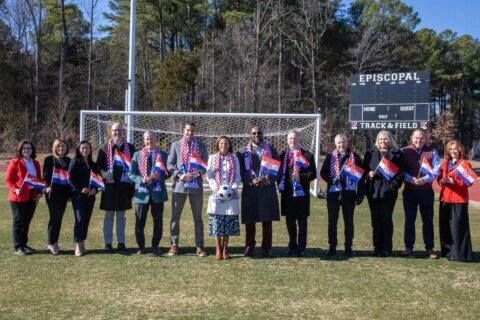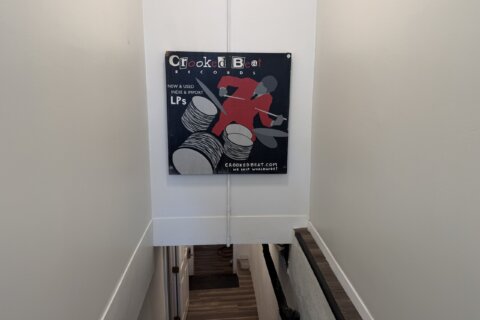The proposed deal to build a sports complex for the Washington Wizards and Capitals in Alexandria, Virginia, could prove costly for taxpayers, according to Patrick Hedger with the Taxpayers Protection Alliance.
News of the facility that may be built in the Potomac Yard neighborhood is concerning for taxpayers, Hedger said, because it’s an example of a company leveraging competing jurisdictions to try to get as much taxpayer funding as possible.
On Tuesday, Virginia Gov. Glenn Youngkin and Monumental Sports & Entertainment owner Ted Leonsis announced their plans to build a facility for the sports franchises in Northern Virginia. The Virginia General Assembly and Alexandria City Council still have to approve the deal before it’s finalized.
D.C. Mayor Muriel Bowser also recently introduced a final offer to renovate Capital One Arena, where the teams currently play.
Related Stories
- Bowser is holding on to hope the Capitals and Wizards will stay in DC — here’s why
- ‘This is monumental’: Capitals, Wizards owners partner up with Virginia for proposed arena, entertainment district in Alexandria
- New Capitals and Wizards Potomac Yard development would be a big win for JBG Smith
- Q&A: How would Wizards, Caps arena in Northern Va. impact area traffic?
“Franchises make grand promises about economic benefits and how long they will be in these arenas,” Hedger told WTOP. “And they routinely then continue to hold localities hostage for more money prior to their deals expiring, thereby forcing taxpayers to pony up more or risk losing the team.”
Monumental’s framework agreement with Virginia calls for Monumental to invest $403 million in the $2 billion development. Alexandria will put in $106 million toward the construction of the performing arts venue and the development of underground parking.
The rest — approximately $1.5 billion — would be supported through bonds issued by a newly established stadium authority. Those bonds would be repaid over time through rent paid by the teams, parking fees, naming rights and new tax revenues generated by the development.
There are no proposed tax increases for local residents.
Hedger compared the potential deal to the agreement that brought the Rams to St. Louis, before the NFL franchise relocated to Los Angeles. The franchise got out of its lease in St. Louis early, “then left St. Louis taxpayers high and dry with an arena without a tenant, and therefore without an income stream to pay back the bonds. I’m very concerned about that happening here,” Hedger said.
Part of the concern, he said, stems from the suspicion that D.C. will try to lure the teams back downtown, should they leave for Northern Virginia in a few years. While professional sports franchises often state their intentions to remain in one place for decades, they “either need upgrades and renovations to that stadium and threaten to leave, or they need an entirely new stadium,” Hedger said.
“The idea that this is going to be a 30, 40-year partnership with the Commonwealth of Virginia is ludicrous to me,” Hedger said.
The fact the facility could be built in Alexandria is particularly alarming, according to Hedger, because “if this deal goes south, you have a much smaller tax base that ends up bearing the brunt of it.”
Alexandria officials, including Mayor Justin Wilson, said the investment is expected to boost economic growth for the region, generating $12 billion of economic impact over the coming decades. Millions are expected to support affordable housing, housing assistance programs, transportation and education.
Hedger considers the funding plan unfair to Virginia taxpayers in other parts of the state, because “it’s hard to see what the economic benefit is for somebody living in Virginia Beach, or somebody living in Blacksburg, for a stadium that exists in Northern Virginia.”
When taxpayer funding is involved in stadium deals, Hedger said, it means there’s usually a significant amount of risk.
“We’ll be looking at when and where state and local governments in Virginia find themselves asking for new tax increases to cover paying for schools, paying for the very basic things that government should be doing, when they’ve given away a bunch of money to a sports franchise a few years prior,” Hedger said.
Some Alexandria residents have similar concerns.
Billionaires such as Leonsis should “build their own stadiums,” Robert Shane told WTOP.
“It’s kind of a crime to think that with all the other issues in Alexandria right now, with the lack of housing, and everything else, that we’re going to cut a tax break for a billionaire to come over and bring a basketball team,” Shane said.
Sandy, who also lives nearby, is concerned about government money being used for private entities.
“It has proven time and time again to be a net economic loss for every government that subsidized a stadium move or stadium construction,” he said.
The Associated Press contributed to this report.







